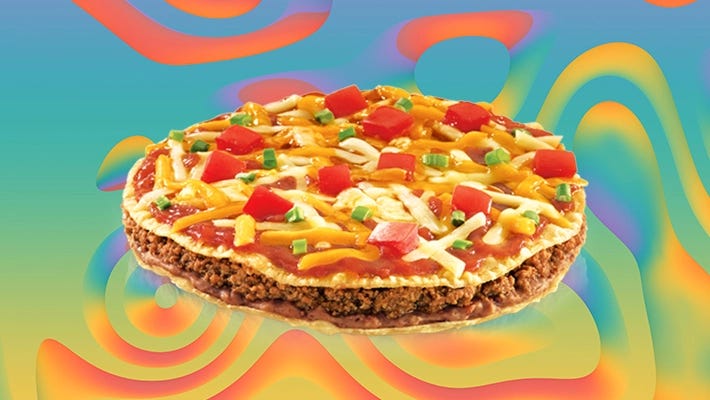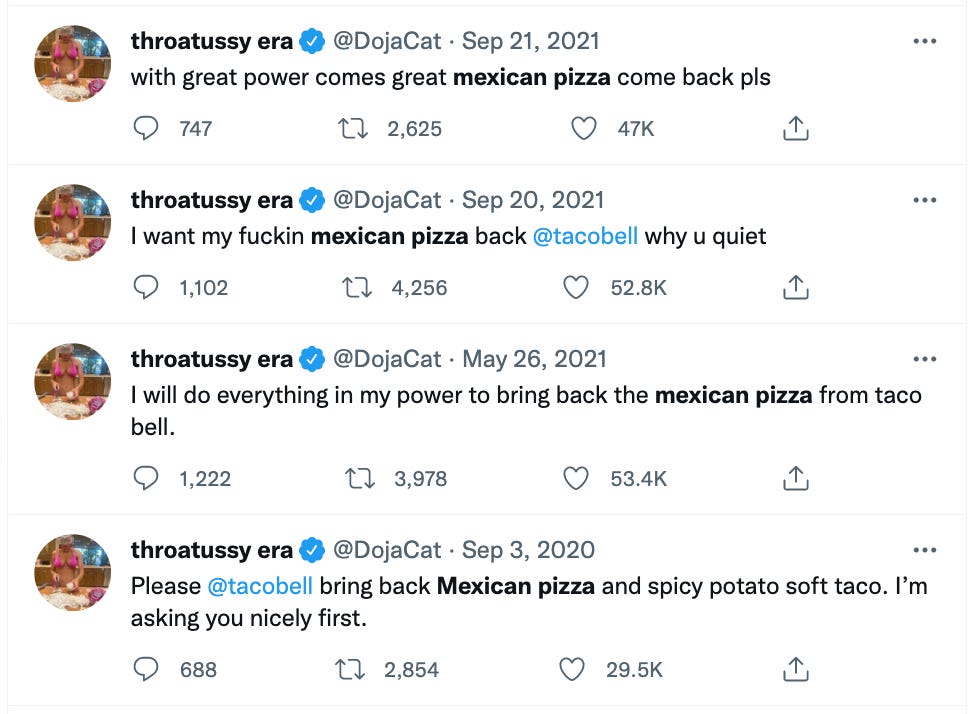Anatomy of the Mexican Pizza Comeback
The Mexican Pizza may have been Taco Bell's biggest bet gone wrong - what can we learn from the marketing of its return?
Remember September 2020?
On top of a raging pandemic, the sky in San Francisco turned orange and increasing anxiety around the election gripped America.
The dark cloud of that month began with an announcement that would live in notoriety for Taco Bell, a menu reinvention that removed many of its fan favorites.
The most crushing part of it all: The removal of the Mexican Pizza.
Corporate gave some nebulous desire for innovation (the same reason they gave for the waffle taco, which sucked!) and a perhaps more rational note about how packaging for Mexican Pizza was hurting the environment.
They ultimately sugarcoated the announcement with a list of new items they were testing and the return of the Doritos Locos combo that, frankly, no one cared about.
I’ll admit, it was a well-thought PR move to anticipate the backlash and give alternatives to superfans in the press release, but I’m sure not even Mike Grams could have fully expected what happened next.
The internet erupted with memes, threats to boycott, petitions, and endless ire toward the Taco Bell brand and its new inventions. For the South Asian diaspora, it hit particularly hard. NPR recently did a piece on Taco Bell's importance to Indian Americans, noting the vegetarian pliancy of its menu items, spice, and flavor, adding that it also evoked a sense of nostalgia and connection to home that made items like the Mexican Pizza a particular fan favorite.
For many, it may not have been that deep. Still, it was essentially the equivalent of the Office getting removed from Netflix - a decision made behind closed doors that, sure, didn’t materially change anyone’s life but a decision nonetheless that nobody asked for.
April 18 finally saw the fateful announcement fans had been waiting for: The Mexican Pizza was returning. In the same announcement, Taco Bell also revealed the crumbs of a successful marketing campaign that saw fan involvement, Doja Cat, and sprinkles of absurdity, including the reference to a Mexican Pizza funeral.
For most people outside of the irrational Taco Bell fandom bubble, you may not have noticed the press release, particularly cared about the menu reinventions, or even noticed that the Mexican Pizza is coming back. Many of you probably find Taco Bell underwhelming.
Still, whether you’re a marketer, a consumer of nonsense on the internet, or simply someone who has read this far and is afraid of how much time you’ve already wasted, you’re probably wondering why this is in the news.
Menu reinventions happen regularly. People get pissed off regularly. Most companies like to reverse their decisions without too much delay.
What is so magical about this particular campaign?
I went under the hood to explore the infamous comeback of Taco Bell’s Mexican Pizza.
What Sparked Taco Bell’s Comeback?
Last month, Mcdonald’s had a tweet that I found to be a fun exercise in understanding your customers. Like Taco Bell, the company has also had its fair share of reinventions. I combed through the tweet to figure out what people would be mad about.
The Snack Wraps were a popular choice, yet discontinued primarily because of lack of demand and inefficiency. The BTS meal was another popular choice, but likely not something Mcdonald’s can support without doing a disserve to other celebrity partnerships. Of course, there were more unique ones that I hadn’t heard much of (steak bagels?), the biggest thing to observe was that there was no sense of unity.
Scattered desires from its customer base led to some quality social engagement but anecdotally didn’t have too much insight for a strategic revelation.
With Mexican Pizza, the outrage was not only consistent from the start but largely unified. It was hard for Taco Bell to get any tweet across for the 18 months after the announcement without some mention of the Mexican pizza.
On the New Year, they tweeted: “New Year, Same Taco Bell order” getting a quality roast in the process. Even when they brought back potatoes, the calls became louder. #FreeTheMexicanPizza became a popular trending hashtag, and fans were unrelenting.
No matter what mundane, creative, or strategically vetted tweet Taco Bell sent, fans would somehow twist the message to incorporate the corporation’s flawed bet on the removal.
When Taco Bell told fans to take a trip down memory lane…
When Taco Bell tweeted about a housewarming….
From the chorus of outraged fans rose a loud, aggressive, blue-checked voice - none other than pop artist Doja Cat, who tweeted multiple times about the incident and got incredible engagement from her incendiary tweets on the Mexican Pizza.
The first sign of something suspicious came in September 2021 when Taco Bell replied to Doja and mentioned Mexican Pizza for the first time from their corporate Twitter.
As it turned out, Taco Bell was in cahoots with Doja Cat, with their agency Deutsch LA partnering with her for a slow rollout of the Mexican Pizza.
A TikTok rap about the Pizza, a Super Bowl commercial, and the final announcement of its return at Coachella all followed the initial rage tweet by Doja Cat. The beauty was in its secrecy, quietly fueling the annoyance of Taco Bell in public while flaming the seeds of a budding return in the background.
In a piece for Adweek by Emmy Liederman and Rafael Canton, the authors go as far as to say that Doja Cat’s “playful self-depreciation” and authentic disgust is a big part of why the collaboration succeeded.
“It’s not even clear what part of this narrative is sponsored and what is just Doja Cat,” said Nate Jones, head of influencer marketing at JUV Consulting. Jones referenced the rapper’s TikTok leading up to the brand’s Super Bowl spot, in which she claims that she’s being “forced to make this video for Taco Bell.” Throughout the clip, she expresses utter disinterest and disgust with the brand. Naturally, Taco Bell leveraged Doja Cat’s rant as fodder to continue building the antihero narrative.”
The collaboration isn’t over as Taco Bell is taking another swing at the rollout with a Mexican Pizza Musical about the fight to bring back the Mexican Pizza, starring both Doja Cat and Dolly Parton.
An absurd addition to any average marketing campaign but one that likely didn’t make any fans bat an eye.
So what ultimately worked here?
The Brand
I do think the first part of the credit goes to the Taco Bell brand and the number of agencies that make it pop - Deutsch, Cashmere, Edelman, and more.
The Taco Bell brand isn’t new to stunts, especially ones that appeal to a broader audience. The brand opened a pop-up hotel, sent rings to models, put a floating board in the Pacific Ocean to land space debris, and even claimed to buy the Liberty Bell as part of an April Fool’s prank. It refers to its Twitter fans as besties, jumps on memes, and shares playful games, creating a brand character that feels exactly like someone you would get late-night Taco Bell with. It’s the person you smoked a joint with in the corner of a crowded house party, the person you’re always excited about playing Cards Against Humanity with. Fun, playful, mysterious, and just a sprinkle of insane.
It remains to be seen whether State Farm or Proctor and Gamble could pull off this same brand campaign but the fabric of somewhat strange publicity is nothing new to Taco Bell.
The Outrage
Take out the brand, and you have another interesting catalyst here: the outrage.
While the closest comparison may be the outrage over the Mcdonald’s McRib, we don’t see much foundational outrage that follows a brand everywhere. Apoplectic tweets ebbed and flowed quickly among the sea of complaints about Mcdonald’s to the point where the McRib return hardly got its own campaign beyond a mere mention. Even initial outrage around the removal of the Chik-Fil A Chicken Biscuit and Subway roast beef was intense but ultimately found neither item to be much of a utility to provoke actual protest. Tons of alternatives existed for each. Few exist for Mexican Pizza.
Let’s first acknowledge the elephant in the room: nobody likes change. Nobody celebrates the removal of menu items. If I learned anything from writing about rebranding, a large part of rebranding outrage comes from how strongly a brand is integrated with your identity. With the Mexican Pizza being a fan favorite for reasons beyond pure taste, it threw our brand association compass haywire. There was generational outrage.
It’s certainly clear Taco Bell wasn’t doing any shock advertising or removing the Pizza for the sake of publicity. It’s also clear there were some decent reasons to remove the Pizza. Bless the environment. But in a way, none of this mattered.
Fans of Taco Bell saw themselves thrown into some sort of Joseph Campbell-type monomyth. Every fan wanted to be the hero in the decisive crisis, yearning for the power to break Taco Bell and return the riches to their fellow peers. While Doja Cat was the face of the operation, the depth, ubiquity, and unrelenting sweat of the actual outrage likely contributed to Taco Bell thinking twice.
Can outrage regularly bring things back? Most corporate decisions are predicated on the expectation that people will move on with the time and there are many layers to a successful boycott, but the Taco Bell takeaway is more complicated. A synchronized, almost cult-like chorus of complaints may actually sting for a brand beyond just a wrist slap from a loud voice.
The Mystery
The last part? The invisible marketing.
Part of the campaign’s magic came from the fact that - well, nobody knew it was happening.
In a world where influencer campaigns are intricately planned with meticulous scripting and a sprinkle of forced brand adulation, Doja Cat’s outrage tweets were precisely the opposite.
Messages we could get behind, emotions we felt, a stage where the line between celebrity and peer was more blurred. It’s unclear whether all brands or consumers could get behind this uncurated chaos, but Taco Bell’s audience responded in droves.
Is it contractually possible for most brands to have their influencers working underground? Taco Bell is certainly rewriting a fascinating playbook for making it work.
While there will certainly be many brands dealing with a backlash and return to the status quo, Taco Bell, to me, is admirable for all of the above: seeding a brand with the playfulness to make a comeback fun, doing the right work to not come back too soon, and above all, remaining customer-focused even in the face of customers ripping them at every corner.
But if Taco Bell thinks its super fans will rest, they’re sadly mistaken.
It’s now time to move all our attention to bringing back the Enchirito.










